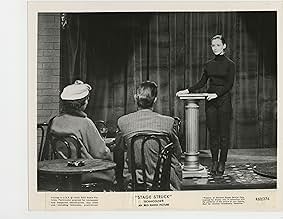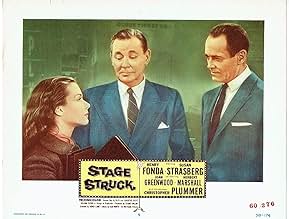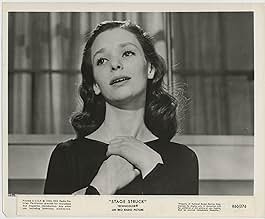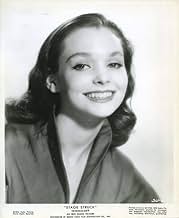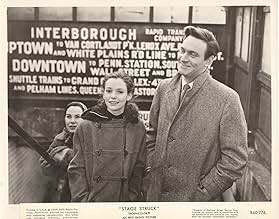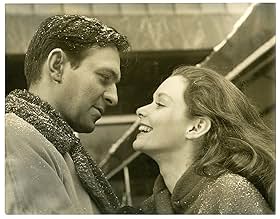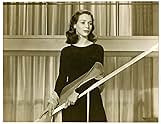Ajouter une intrigue dans votre langueA young woman arrives in New York City determined to become a great theatrical star, but discovers that her goal may not be as easily attainable as she had hoped.A young woman arrives in New York City determined to become a great theatrical star, but discovers that her goal may not be as easily attainable as she had hoped.A young woman arrives in New York City determined to become a great theatrical star, but discovers that her goal may not be as easily attainable as she had hoped.
- Réalisation
- Scénario
- Casting principal
Pat Harrington Sr.
- Benny
- (as Pat Harrington)
Pat Englund
- Gwen Hall
- (as Patricia Englund)
Merle A. Ashley
- Minor Role
- (non crédité)
Dario Barri
- Handsome Young Man
- (non crédité)
Rolly Bester
- Minor Role
- (non crédité)
Leon Bibb
- Guitar Player
- (non crédité)
Avis à la une
Susan Strasberg plays Eva Lovelace, an aspiring Broadway actress possessed by some theatric god that directs her to precisely pronounce and deliver each and every word with impeccable timing. She comes to New York by way of Vermont where she performed in numerous summer stock productions and her persistence and personality capture the attention of playwright Joe Sheridan (Peter Cushing) and actor Robert Marley Hedges (Herbert Marshall). Producer Lewis Easton (Henry Fonda) tells her to study the Actor's Studio (would that be Lee Strasberg's school of method acting?) but she doesn't want to dilute her gift by having it altered in an acting school. Strasberg's performance makes and at times almost breaks this picture. It manages to annoy and captivate, often simultaneously. When she delivers Juliet's lines on the stairway of Easton's swank townhome after drinking four or five glasses of Champaigne in front of a party of theater luminaries, it knocks you out. It is as if Eva Lovelace is playing Susan Strasberg. In any event, she (Strasberg) has an unusual beauty and sincerity that come shining through in spite of the theatrics.
Vermont girl Gertrude Langenfelder (Susan Strasberg) has come to New York City to be a Broadway star under the stage name Eva Lovelace. She's desperate to get any part with producer Lewis Easton (Henry Fonda). Joe Sheridan (Christopher Plummer) is the writer. Despite not liking the role, Rita Vernon (Joan Greenwood) is the leading lady.
This movie depends a lot on Susan Strasberg's performance. All I can say is that she enunciates her lines very knowingly. She's playing a part when the role requires her to be an IT girl. She has to be a newly born diamond outshining all the other diamonds. It's asking a lot and she struggles. I'm sure that her father taught her well but there is something innate about stardom. Every moment with her is a performance when she needs to simply be a superstar. The role may be classified as a try-hard but the actress cannot be just try-hard. The difference is the margin between functional and greatness. This movie has enough acting power to light up Broadway but Susan's flickering light leaves a dull spot at its center. The simple story is not original enough to overpower its flaws.
This movie depends a lot on Susan Strasberg's performance. All I can say is that she enunciates her lines very knowingly. She's playing a part when the role requires her to be an IT girl. She has to be a newly born diamond outshining all the other diamonds. It's asking a lot and she struggles. I'm sure that her father taught her well but there is something innate about stardom. Every moment with her is a performance when she needs to simply be a superstar. The role may be classified as a try-hard but the actress cannot be just try-hard. The difference is the margin between functional and greatness. This movie has enough acting power to light up Broadway but Susan's flickering light leaves a dull spot at its center. The simple story is not original enough to overpower its flaws.
Poor Susan Strasberg. She had not an easy life. She was so lovely. But her delivery in this movie - a remake of a Katharine Hepburn 30s vehicle called "Morning Glory" - is simply not good. It doesn't help that the script is a cliché of a cliché of a cliché, if there is such a thing. Henry Fonda does the best he can with the bad, hoary lines. The supporting cast of Joan Greenwood and Christopher Plummer are excellent and fascinating as usual, but they're stuck with bad lines. In Greenwood's case, bad lines complaining about bad lines!!! And even though Fonda is good, you can't believe Susan would really go for him.
The best thing about the movie is the scene backstage towards the end when the show that might make Strasberg a star, is just about to start. The movie's director shows the stagehands being called their cues by the stage manager, and you get the suspense of what it's like to be backstage just before the curtain goes up.
The stage manager by the way is played by Jack Weston, who played a stage manager the next year in Douglas Sirk's "Imitation of Life," which is also about "the theatuh," and in its complex phoniness and artificiality it rings truer than "Stage Struck." Beloved Herbert Marshall is also in this movie and you can see very easily that he is really walking on a wooden leg.
The street scenes of New York are interesting in this movie. Also interesting is the name of a Greenwich Village nightclub where Strasberg cringingly reads poetry and verse: The Village Voice!
The best thing about the movie is the scene backstage towards the end when the show that might make Strasberg a star, is just about to start. The movie's director shows the stagehands being called their cues by the stage manager, and you get the suspense of what it's like to be backstage just before the curtain goes up.
The stage manager by the way is played by Jack Weston, who played a stage manager the next year in Douglas Sirk's "Imitation of Life," which is also about "the theatuh," and in its complex phoniness and artificiality it rings truer than "Stage Struck." Beloved Herbert Marshall is also in this movie and you can see very easily that he is really walking on a wooden leg.
The street scenes of New York are interesting in this movie. Also interesting is the name of a Greenwich Village nightclub where Strasberg cringingly reads poetry and verse: The Village Voice!
Some people are born with talent. Some can acquire it. Others can take all the lessons in the world, and still not grasp that elusive "it". And that's the problem with Susan Strasberg's performance: she clearly understands the nuances and subtleties of acting, but cannot connect that knowledge to the empathy and passion an actor must have to be believable in their role.
When at the party, Eva Lovelace recites the balcony scene from "Romeo & Juliet", and the guests become transfixed, I was never sure if they were staring in awe or horror. Strasberg pauses and reflects on her words perfectly -- at these moments, one could believe she's Juliet watching and waiting for her lover's answers. But when she recites the words -- and a recitation is all it is -- the fire, the passion of Juliet for Romeo is non-existent. She could just as easily have been telling the doorman to call her a cab.
The most interesting aspect of the film was in watching the various methods of acting being presented. Herbert Marshall (who started in silents and early talkies), Henry Fonda (who started in film in the 1930s) and Christopher Plummer (one of the new method actors) are all believable in their roles and mesh seamlessly together. Then there's Strasberg, who is incapable of presenting even a fraction of the range of any of her co-stars. (Frankly, I didn't make the connection between her and her father, and wondered who she knew to have secured the role.) The film is interesting as a curio piece, and Lumet's brilliance in portraying New York's scenery. But as a moving story about the theatre, it can't touch "All About Eve".
When at the party, Eva Lovelace recites the balcony scene from "Romeo & Juliet", and the guests become transfixed, I was never sure if they were staring in awe or horror. Strasberg pauses and reflects on her words perfectly -- at these moments, one could believe she's Juliet watching and waiting for her lover's answers. But when she recites the words -- and a recitation is all it is -- the fire, the passion of Juliet for Romeo is non-existent. She could just as easily have been telling the doorman to call her a cab.
The most interesting aspect of the film was in watching the various methods of acting being presented. Herbert Marshall (who started in silents and early talkies), Henry Fonda (who started in film in the 1930s) and Christopher Plummer (one of the new method actors) are all believable in their roles and mesh seamlessly together. Then there's Strasberg, who is incapable of presenting even a fraction of the range of any of her co-stars. (Frankly, I didn't make the connection between her and her father, and wondered who she knew to have secured the role.) The film is interesting as a curio piece, and Lumet's brilliance in portraying New York's scenery. But as a moving story about the theatre, it can't touch "All About Eve".
Susan Strasburg was method acting guru Lee Strasburg's daughter.The film is peppered with acting luminaries such as Henry Fonda, Christopher Plummer and Herbert Marshall. I was however strongly reminded of a film on a rather similar theme "All about Eve" where again an ambitious young novice actress seeks to advance her career - at the expense of ageing actress played by Bette Davis. The screenplay by Joseph L. Mankiewicz has become immortal as in "Fasten your seatbelts, it's going to be a bumpy night! ".
Not one line of Stage Struck is memorable. My attention was only briefly attracted by something surely unintended around 30 minutes in. Strasburg, Fonda and Herbert Marshal perform part of a Shakespeare play. Henry Fonda was OK but Susan Strasburg quacked and gave no indication of promise even. But Herbert Marshall spoke his lines wonderfully. Marshal, I suddenly realised had wasted and misdirected his talents, not least here.
Interesting Herbert Marshall trivia: During the First World War, Marshall served ... with fellow actors Basil Rathbone, Ronald Colman, Cedric Hardwicke and Claude Rains. (Wikipedia) Coincidentally perhaps the greatest and most distinctive vocal talents in cinema history.
Not one line of Stage Struck is memorable. My attention was only briefly attracted by something surely unintended around 30 minutes in. Strasburg, Fonda and Herbert Marshal perform part of a Shakespeare play. Henry Fonda was OK but Susan Strasburg quacked and gave no indication of promise even. But Herbert Marshall spoke his lines wonderfully. Marshal, I suddenly realised had wasted and misdirected his talents, not least here.
Interesting Herbert Marshall trivia: During the First World War, Marshall served ... with fellow actors Basil Rathbone, Ronald Colman, Cedric Hardwicke and Claude Rains. (Wikipedia) Coincidentally perhaps the greatest and most distinctive vocal talents in cinema history.
Le saviez-vous
- AnecdotesEva Lovelace (Susan Strasberg) is told to join the Actors Studio to learn her craft. In real life, Strasberg was the daughter of Lee Strasberg, the acting coach and director of the studio.
- Citations
Lewis Easton: [to Eva] You're a hungry little girl - the theater's offering you a feast.
- ConnexionsFeatured in Hollywood the Golden Years: The RKO Story: Howard's Way (1987)
Meilleurs choix
Connectez-vous pour évaluer et suivre la liste de favoris afin de recevoir des recommandations personnalisées
- How long is Stage Struck?Alimenté par Alexa
Détails
- Durée1 heure 35 minutes
- Couleur
- Rapport de forme
- 1.37 : 1
Contribuer à cette page
Suggérer une modification ou ajouter du contenu manquant

Lacune principale
By what name was Les feux du théâtre (1958) officially released in India in English?
Répondre

